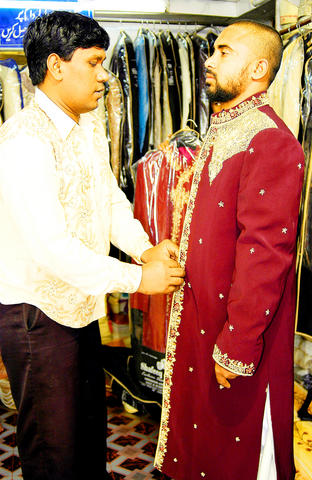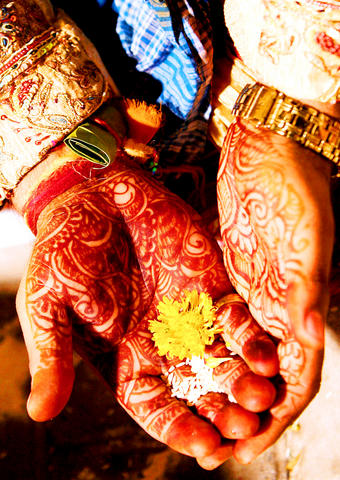Like many young Indian women in search of husbands, Sneha Singh combed through the pages of matrimonial classifieds in the daily newspapers until she found what she thought was a perfect match: a man from a decent family, with a good education, a US passport and lucrative salary as a software engineer in California's Silicon Valley.
She envisioned a new life for herself in sunny California. She found later that almost none of it was true, but by then she had already tied the knot.
As many as 30,000 Indian women, according to a government estimate - experts say the true number is likely much higher - are duped every year into fraudulent marriages by husbands living abroad.

PHOTO: AFP
It is part of a growing problem in India, where rising prosperity is spawning what many here only half-jokingly call the "wedding industrial complex" as the cost of weddings and dowries given by the bride's family spiral upward.
At the time of her wedding, Singh was 32 and eager to start a family of her own.
"There were warning signs from the very beginning, but the wedding preparations had a momentum of their own, making it difficult to speak up. Two days after marrying him, I realized I had been duped," said Singh, now 35, with long black hair, high cheekbones and a confident smile.

PHOTO: AFP
The soaring dowries are creating an incentive for fraud, analysts say.
In India's more prosperous cities, it is not uncommon for grooms to walk away with dowries of about US$100,000. Some dowries reach as high as US$500,000 in cash, gold, diamonds and property.
Dowries are prohibited in India by a rarely enforced 1961 law. In fact, fathers often take out bank loans to help pay for a daughter's lavish wedding, usually seen as a once-in-a-lifetime event.

PHOTO: AFP
In their eagerness to marry off their daughters to Indian people working abroad, families often ignore one very important marriage protocol: background checks.
Parents don't want to ask a suitor probing questions that might seem impolite, discouraging him from the marriage. That's according to a 94-page booklet titled Marriages to Overseas Indians, put out by officials at India's Ministry of Overseas Indian Affairs, an agency created three years ago to look after the 25 million Indians living abroad.
Within two weeks of Singh's marriage, her husband returned to the US without her, but with more than US$2,000 in wedding gifts. He promised to apply for her visa so she could join him in California, but never did. Months later, Singh's father began receiving threatening letters from his new son-in-law demanding tuition money for an advanced business degree.
As it turned out, her husband, 40, had been unemployed and receiving welfare checks in the US, she said. Also, he was a serial groom, having been married at least a dozen times. Marriages in India are seldom registered with state authorities, as is required by law.
Many marriage scams are carried out by non-resident Indians - often with American or European passports - who breeze into India for a couple weeks seeking brides with huge dowries, then flee to their adoptive countries to evade prosecution by Indian authorities.
The stigma surrounding failed marriages is so strong in India that wives abandoned by their non-resident Indian husbands are more likely to bear it quietly, without taking the husband or the husband's family to court. Although exposure to the West is gradually changing social values, divorce is still rare enough that the word is often whispered in India.
"It's absolutely the perfect crime, and it's a big problem," said Madhu Gand, a member of India's parliament and an adviser to the Ministry of Overseas Indian Affairs.
Women's groups in India and in many Western countries are pushing for laws that make marriage fraud an extraditable offense.
"We have laws in India that protect wives from fraudulent marriages, but if the husbands live in Britain, the US or Canada, and especially if they have citizenship in those countries, there's not much we can do to them right now. That's something we need to work on," said Gand, who owns a law firm in New York.
Most abandoned brides never file their cases with the police or the courts because it is a stain not only on the girl, but her entire family, said Singh, who used her experience as an abandoned bride to start the ARK Foundation, a non-profit agency that helps women who have been defrauded or abused by their non-resident Indian husbands.
Expatriate Indians often cave in to parental pressure to marry at home, usually to a woman the parents have already picked out. It is not uncommon for a prospective groom to return to India and be married within days to a woman he has never met.
To marry one of the nearly half-million Indians seeking work or studying abroad every year is seen as prestigious in many parts of India, especially in the northern state of Punjab, where most families have at least one relative living abroad.
For many Punjabi women, marrying an expatriate Indian comes with the promise of good jobs for both spouses and an escape from India's often suffocating family customs in which wives usually are expected to run the household and care for in-laws.
Statistically, marriages between resident and non-resident Indians don't last long. Recent studies by several Indian women's groups found that the vast majority of them fail within the first two years.
One study found that five out of every six failed. The cultural gap between the spouses is often too wide to bridge.
"It's a gamble," said Singh. "But many parents are willing to play this gamble with their daughters."

April 28 to May 4 During the Japanese colonial era, a city’s “first” high school typically served Japanese students, while Taiwanese attended the “second” high school. Only in Taichung was this reversed. That’s because when Taichung First High School opened its doors on May 1, 1915 to serve Taiwanese students who were previously barred from secondary education, it was the only high school in town. Former principal Hideo Azukisawa threatened to quit when the government in 1922 attempted to transfer the “first” designation to a new local high school for Japanese students, leading to this unusual situation. Prior to the Taichung First

The Ministry of Education last month proposed a nationwide ban on mobile devices in schools, aiming to curb concerns over student phone addiction. Under the revised regulation, which will take effect in August, teachers and schools will be required to collect mobile devices — including phones, laptops and wearables devices — for safekeeping during school hours, unless they are being used for educational purposes. For Chang Fong-ching (張鳳琴), the ban will have a positive impact. “It’s a good move,” says the professor in the department of

On April 17, Chinese Nationalist Party (KMT) Chairman Eric Chu (朱立倫) launched a bold campaign to revive and revitalize the KMT base by calling for an impromptu rally at the Taipei prosecutor’s offices to protest recent arrests of KMT recall campaigners over allegations of forgery and fraud involving signatures of dead voters. The protest had no time to apply for permits and was illegal, but that played into the sense of opposition grievance at alleged weaponization of the judiciary by the Democratic Progressive Party (DPP) to “annihilate” the opposition parties. Blamed for faltering recall campaigns and faced with a KMT chair

Article 2 of the Additional Articles of the Constitution of the Republic of China (中華民國憲法增修條文) stipulates that upon a vote of no confidence in the premier, the president can dissolve the legislature within 10 days. If the legislature is dissolved, a new legislative election must be held within 60 days, and the legislators’ terms will then be reckoned from that election. Two weeks ago Taipei Mayor Chiang Wan-an (蔣萬安) of the Chinese Nationalist Party (KMT) proposed that the legislature hold a vote of no confidence in the premier and dare the president to dissolve the legislature. The legislature is currently controlled